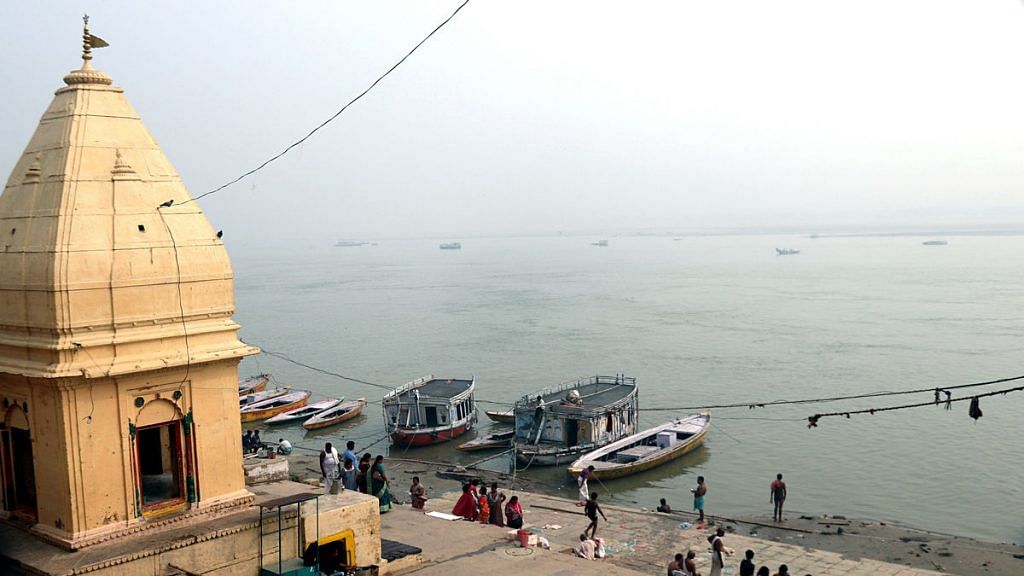New Delhi: The Indian Council of Medical Research (ICMR) has turned down the Narendra Modi government’s “request” to conduct research on a theory that Gangajal, or water from Ganga river, could possibly cure Covid-19.
Speaking to ThePrint, a source in the ICMR said the agency has refused to get involved as it is focussing on the Covid-19 battle and doesn’t want to waste time on other research amid the pandemic.
The move came after the country’s apex medical research body received a “request” from the Ministry of Jal Shakti to conduct “further research” on a proposal by an NGO, Atulya Ganga, said an ICMR official, who didn’t wish to be named.
In its letter last month, Atulya Ganga had cited the presence of a ‘ninja virus’, called bacteriophage, in Ganga’s water that could cure Covid-19. Bacteriophage is a special type of virus that eats harmful bacteria, the letter said. Covid-19 is a virus.
The NGO asked the government on 3 April to conduct a study on the possibility of this virus acting as a cure. It sent a copy each to the ministry and the Prime Minister’s Office (PMO).
The ministry’s National Mission for Clean Ganga, the department administering the Modi government’s ambitious Namami Gange programme, then wrote to ICMR on 30 April requesting a clinical trial.
The ICMR then held a meeting to discuss the idea, but refused to proceed, offering only its “help” to the NGO.
“We had indeed received a letter from the Ministry of Jal Shakti for such research. The experts at ICMR also held a meeting on this matter. Then we asked those proposing this research that you should tell us about hospitals and doctors that are ready and willing to conduct some research on it. We will certainly help them in this regard,” said the ICMR official.
“As of now we are still treating plasma therapy as a trial for treatment for corona (Covid-19), then how can we so quickly accept a virus called bacteriophage, found in the water of Ganges, as a cure? Right now, there is no logic in the argument that the virus found in Ganga’s water can indeed fight the coronavirus disease,” added the official.
However, he added that if the ministry takes an initiative into the matter then ICMR will extend its assistance to it.
Speaking to ThePrint, Dr. Rajnikant Srivastava, ICMR’s head of the Department of Research Management, Policy Planning and Communication, in Delhi and Director of Regional Medical Research Centre, Gorakhpur, said, “A presentation was made after the Jal Shakti ministry’s proposal. The matter is at a very preliminary stage. Nothing has been decided on the future course of action. We will support the Jal Shakti ministry in all the work it does on this front.”
A senior official of the Ministry of Jal Shakti, meanwhile, said there are several special properties in the Ganga river and many people were demanding research on them.
“We sent a letter to ICMR on this issue,” the official, who didn’t wish to be named, told ThePrint. He added that the ministry is aware that ICMR is busy these days.
“It takes many years for such research. Therefore, we should also be patient with our expectations. When they will get time, they will do research,” said the official.
Also read: How India can be a world leader in making Covid vaccine and keeping it cheap too
Focus on bacteriophage
Atulya Ganga member Colonel (Retd.) Manoj Kishwar spoke to ThePrint on the NGO’s proposal to study the impact of bacteriophage on Covid-19.
“We had written a letter to the Prime Minister and the Jal Shakti Ministry in this context. After this, the Ministry of Jal Shakti requested the ICMR that if there is indeed some truth in this fact then further research should be conducted,” he said.
Kishwar said several bacteriophages are present in the water of Ganges, which come “from the higher mountains, to fight such ailments”.
According to the NGO’s letter, various institutions including the Indian Institute of Technology (IIT), Roorkee, IIT Kanpur, Council of Scientific and Industrial Research (CSIR)-Indian Institute of Toxicology Research, Lucknow have confirmed the presence of many types of bacteriophage in Gangajal, particularly in the river’s upper stream, referred to as Bhagirathi.
After the letter was sent, the PMO asked the Ministry of Jal Shakti to look into the matter.
The National Mission for Clean Ganga then requested the ICMR for a clinical trial.
The issue was also discussed between the scientists of CSIR-National Environmental Engineering Research Institute (NEERI) and the NGO on 24 April. During this video interaction, the CSIR-NEERI scientists suggested that ICMR should be entrusted with the task of identifying the elements present in Ganga’s water that could be helpful in fighting Covid-19, said sources.
However, India’s chief medical research body that has 21 research centres refused to get involved.
“The ICMR has already asked to conduct medical trials for the effectiveness of plasma therapy. Right now, it is more important to ensure proper treatment of patients with Covid-19 disease. For this, scientists should focus more towards developing a vaccine,” said Professor U.N. Rai, a retired scientist who had previously worked with the CSIR-National Botanical Research Institute, Lucknow.
This report has been updated to incorporate Dr. Rajnikant Srivastava’s comments.
Also read: Can’t understand research jargon around Covid-19? Here’s a basic primer to get you started
